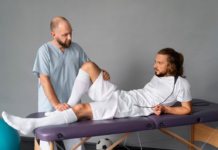Caring for the medical needs of elderly loved ones can be both rewarding and challenging. As they age, their health requirements change, making it essential to stay proactive.
Whether it’s ensuring they get proper nutrition, helping them manage medications, or supporting them through significant procedures, these some ways can guide you in taking better care of the elderly.
1. Regular Health Checkups
Routine health checkups are crucial for detecting potential health issues early. Elderly individuals should visit their healthcare provider regularly to monitor chronic conditions, check for new symptoms, and ensure that their medications are working effectively.
Regular checkups can help prevent minor issues from becoming significant problems, giving you peace of mind that your loved ones are in good health.
2. Medication Management
As people age, they often take multiple medications, which can be overwhelming. It’s vital to help elders manage their medications by setting up a system that ensures they take the correct doses at the right times.
Using a pill organizer, setting reminders, or even downloading a medication management app can make this task easier. Proper medication management reduces the risk of missing doses or taking incorrect amounts, which can have serious health consequences.
3. Nutrition and Hydration
A balanced diet and proper hydration are essential for the elderly. Their nutritional needs change with age, requiring more focus on vitamins, minerals, and protein to maintain strength and energy. Encourage a diet rich in fruits, vegetables, lean proteins, and whole grains, and make sure they drink enough water throughout the day.
Sometimes, medical conditions like difficulty swallowing, which might require an esophageal surgical procedure, can impact their ability to eat or drink. In such cases, working with a nutritionist or doctor to create a suitable diet plan is crucial.
4. Physical Activity and Exercise
Staying active is vital for maintaining physical health, mental well-being, and independence in older adults. Gentle exercises like walking, swimming, or yoga can improve mobility, balance, and flexibility, reducing the risk of falls.
After procedures like hip replacement surgery, physical therapy becomes essential to regain strength and mobility. Encourage them to follow their doctor’s recommendations for physical activity to stay fit and active.
5. Mental and Emotional Support
Mental and emotional health is as important as physical health. Many elderly individuals may experience feelings of loneliness, depression, or anxiety. Regular social interaction, whether through visits, phone calls, or video chats, can help them feel connected and valued.
Encourage them to engage in hobbies, join social groups, or even consider therapy if they’re struggling with mental health issues. Mental stimulation through activities like puzzles or reading can also keep their minds sharp.
6. Assistive Devices and Mobility Aids
As mobility decreases with age, using assistive devices like canes, walkers, or hearing aids can help maintain independence and improve the quality of life. These devices should be regularly checked and adjusted as needed to ensure they are effective and comfortable.
If your loved one has undergone an esophageal surgical procedure or another significant medical treatment, they may also need special equipment to aid in their recovery.
Conclusion
Caring for the medical needs of elders requires attention to their physical, emotional, and mental well-being. By ensuring regular checkups, managing medications, providing proper nutrition, and offering emotional support, you can help your elderly loved ones live healthier, happier lives.

















